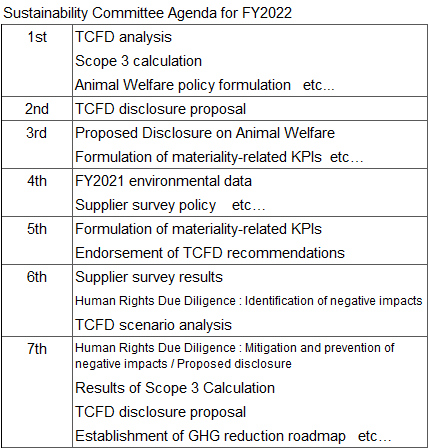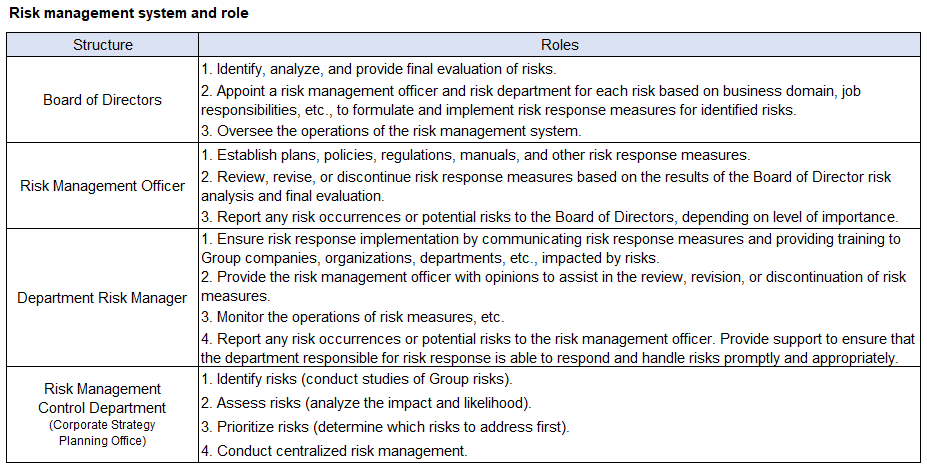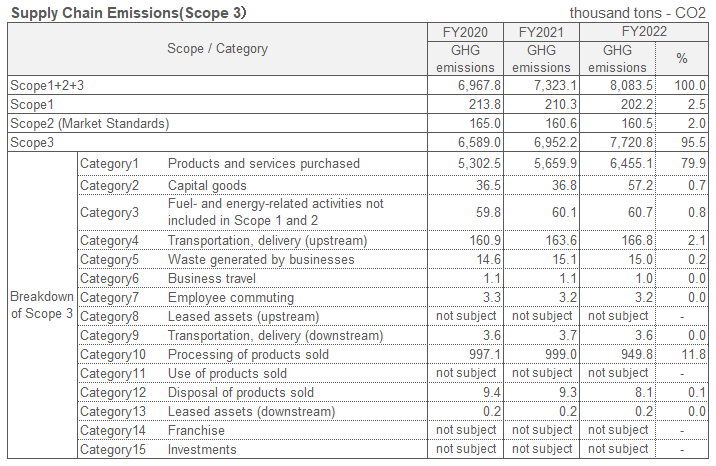ITOHAM YONEKYU Group's Approach
The ITOHAM YONEKYU Group recognizes that preserving the global environment is one of the most important issues, shared across the world. We take the environment into account in our business activities as we declare that actively working to achieve a sustainable society is our environmental philosophy.
We endorse the recommendations of the Task Force on Climate-related Financial Disclosures (TCFD), which was established by the Financial Stability Board (FSB) at the request of the G20. We are committed to disclosing climate change-related risks and opportunities appropriately.
Information disclosure in line with TCFD recommendations
Governance
We are aware that maintaining the global environment is one of the most important issues, shared a cross the world. We take the environment into account in our business activities as we declare that actively working to achieve a sustainable society is our environmental philosophy.
We recognize that appropriate responses to the risks and opportunities arising from climate change are particularly important management issues. We conduct company-wide efforts to address these risks and opportunities.
The Company's Sustainability Committee, an advisory body to the Board of Directors, deliberates basic policy and strategy on climate change, establishes performance metrics , and monitors progress, which are then reported to the Board for discussion.
The Sustainability Committee is chaired by the Director, Managing Executive Officer and Senior General Manager COO of the Administration Division and includes managers responsible for each business division and outside experts as committee members, ensuring a committee structure that benefits from outside knowledge.
In FY2022, the committee met seven times to discuss the following matters.

We appoint a sustainability promotion officer in each business division and corporate departments to communicate sustainability initiatives to each business division and department, as well as to accelerate the pace of sustainability initiatives.
Strategy
We handle livestock and processed livestock products in the course of our business. We understand that climate change may impact our businesses in various ways, including the impact on livestock caused by rising temperatures due to climate change, the interruption of operations due to severe natural disasters, and declining demand for livestock products as society trends toward decarbonization.
Given these circumstances, we believe in the utility of identifying risks and opportunities for our business under all possible scenarios, regardless of likelihood, and of considering measures to respond to these risks and opportunities to enhance the sustainability of our businesses.
In FY2021, the Company began conducting analyses in accordance with the TCFD recommendations to identify climate change-related risks and opportunities. We then performed a qualitative risk assessment related to said risks and opportunities.
To conduct more detailed analyses, in FY2022, we conducted a quantitative and qualitative business impact assessment of risks and opportunities we believe could have a particularly outsized impact on our businesses. We involved the heads of each business division and the business strategy general manager in this process.
We are considering expanding the scope of coverage in the future.
1.Scenario analysis assumptions
Businesses Analyzed
Processed Food business and Meat business
Base Year
2030 (medium-term), 2050 (long-term)
Climate Scenarios
We selected the Stratified Societies Scenario (SSS) under The future of food and agriculture - Alternative pathways to 2050 , published by the Food and Agriculture Organization of the United Nations (FAO) as the 4℃ scenario. We used Towards Sustainability Scenario (TSS) as the 2℃ scenario.
We based carbon pricing on the Sustainable Development Scenario (2℃) and Net Zero Emissions by 2050 Scenario (1.5℃) in the World Energy Outlook 2021 published by the International Energy Agency (IEA).
2.Climate change-related risks and opportunities
The following represent the main climate change-related risks and opportunities for the Company, assuming the business environments of 2030 and 2050 for society that is decarbonized (transition risk ) and society that is not decarbonized (physical risk).
We determined the priority qualitatively based on likelihood and the impact on our business.

3.Business impact evaluation results and response measures
We included in our quantitative and qualitative analysis for FY2022 those risks and opportunities we believe could have a particularly significant impact on our businesses.
Although these risks and opportunities impact both our Processed Food and Meat businesses, we limited the FY2022 analysis, with the exception of carbon pricing, to the main businesses affected.
We recognize that from FY2023 onward, we will be challenged in expanding risks and opportunities and the businesses selected for analysis.


We evaluated the results of the quantitative analysis on a four-stage scale according to the degree of impact on our operating income, as shown below.
 The chart below indicates the results of the analyses of each risk and opportunity, as well as measures to be taken.
The chart below indicates the results of the analyses of each risk and opportunity, as well as measures to be taken.
The results of these analyses reflect our perceptions based on each climate scenario and include uncertainties. These results do not necessarily represent our future outlook.
◆Transition Risks

If the countries and regions in which we operate introduce carbon pricing as society continues to decarbonize, costs could increase in line with ITOHAM YONEKYU Group* GHG emissions as follows. This cost burden could be particularly significant under the 1.5℃ scenario.
*ITOHAM YONEKYU HOLDINGS and subsidiaries

<Response Measures>
We have set a reduction target to halve ITOHAM YONEKYU Group GHG emissions by FY2030 (compared to FY2016) and achieve net zero emissions by FY2050.
We plan to create a roadmap to achieve our reduction targets and reduce emissions steadily. At the same time, we are considering the development of internal systems to pursue reductions.
Specific reduction efforts include the installation of solar power generation equipment, installing high-efficiency and energy-saving equipment at manufacturing sites, and switching to electricity from renewable sources.
At ANZCO FOODS, our overseas subsidiary, we are reducing the use of coal boilers. Here, we are installing high-temperature heat pumps, collaborating with a research institute to reduce methane emissions from cattle feedlots, and installing solar power generation equipment in the manufacturing sites.
We also conduct business in the livestock industry, and livestock-derived emissions account for approximately 15% of our group GHG emissions.
We have not yet established effective ways to reduce livestock-derived emissions; however, we intend to play our part to solve issues throughout the livestock industry through initiatives that include those described below.
Visualization System for Reducing Greenhouse Gas Emissions in Beef Cattle Production
We cooperate with the Business of Building a System for Visualization of Reduction in Greenhouse Gases in Cattle Production (joint project of the Japan Cattle Industry Cooperative and the Tokyo University of Agriculture) through Mirai Farm Co., Ltd., a cooperating farm in our Wagyu production business.
The purpose of this project is to establish a system to provide beef cattle producers with a direction for GHG reduction through the scientific identification and visualization through advanced approaches that include (1) using feed that reduces methane in cattle burps , and (2) encouraging the rapid aerobic fermentation of excreta.
In June 2021, we began feeding certain of the Japanese Black cattle raised at Mirai Farm with a cashew nut shell liquid feed (Ruminap® *) derived from natural ingredients. This feed suppresses methane in cattle burps, and this experience led to our cooperation in the aforementioned project.
By joining proof-of-concept tests on the effects of using this feed, we contribute to the reduction of methane in cattle burps. As a company involved in the livestock industry, we endeavor to reduce environmental burdens and support sustainable Wagyu production.
*Ruminap® is a registered trademark of SDS Biotech K.K.
 Under the 2℃ scenario, society is expected to become more environmentally friendly and decarbonized as a whole, and consumers desire to purchase products with lower social and environmental impacts.
Under the 2℃ scenario, society is expected to become more environmentally friendly and decarbonized as a whole, and consumers desire to purchase products with lower social and environmental impacts.
We expect meat consumption to decrease significantly by 2030 and 2050, assuming a shift in demand to foods with lower environmental impact, especially in developed countries. Japan is likely to see a significant decrease in meat consumption, forecast to decrease by 15% in 2030 and 27% in 2050 (compared to 2012).
In other countries and regions, demand for meat should increase through 2030 with gains in economic growth, but decrease toward 2050.
Under the 2℃ scenario, we recognize that declining demand for meat in Japan, the main market for our Processed Food business, would reduce demand for our livestock products such as ham and sausage. This decline could have a significant impact on our Processed Food business sales in the medium to long term.
<Response Measures>
We already develop and market vegetable protein products as a response to the declining demand for livestock products (see Opportunities section for more details).
In addition, we are looking at research and development for other alternative proteins, including cultured meats, and also to grow sales of Cooked Foods products.
With an extensive lineup of beef, pork, and chicken products, we believe we can respond flexibly to shifts in demand among livestock types while keeping an eye on consumption trends.
Cultured Meats
We opened the joint research seminar on the social implementation of cultured meat together with the Graduate School of Engineering, Osaka University and Toppan Holdings Inc. to pursue concrete initiatives for social outfitting of edible cultured meat manufacturing technology through 3D bioprinting. In addition to leading research in this area, we established the Consortium for Future Innovation by Cultured Meat, consisting of the aforementioned entities, SHIMADZU Corporation, and SIGMAXYZ Holdings Inc.
Through this inter-company collaboration, we pursue the value chain running from the application development of 3D bioprinting technology to production and distribution and contribute to public-private cooperation for the development of legal regulations.
At the Expo 2025 Osaka, Kansai, Japan, we plan to exhibit cultured meat as a food of the future that will reduce environmental impact and solve the global protein shortage. Here, our aim is to foster an understanding among consumers and become the leading company in the world to make cultured meat available for human consumption.
◆Transition opportunity
 Under the 2℃ scenario, the production of alternative meats with lower environmental impact is expected to increase in response to higher environmental awareness.
Under the 2℃ scenario, the production of alternative meats with lower environmental impact is expected to increase in response to higher environmental awareness.
Industry experts expect production in Europe, the U.S., and China to increase significantly beginning around 2030. Production in less developed countries, such as those in Southeast Asia, will likely exceed the production of certain developed countries by 2050.
In this environment, this development could be a major business opportunity for our company, which handles vegetable protein products, to increase sales in the medium to long term.
<Response Measures>
We began marketing plant-based soy meat products as a meat alternative in 2020, expanding our product lineup to 37 items in FY2021.
We continue to expand our product lineup and conduct research and development to create products that more closely resemble meat in terms of texture, taste, and aroma.
Plant-Based Food Products
We continue to expand the product lineup for each series in our MARUDE ONIKU! plant-based food brand (products using soybean meat) to provide customers with new protein options.
◆Physical Risks

Under the 4℃ scenario, meat production is likely to increase through 2050 as the population grows. This increase is expected if society as a whole does not decarbonize and consumers do not become more environmentally conscious than under the 2℃ scenario.
In Japan, in particular, we expect meat consumption to increase toward 2030, even taking into account population decline. This demand should remain at a high level, although a decline will likely begin after 2030.
At the same time, yield per acre of crops used to feed livestock are expected to decrease for certain crops. This decrease depends on the type of crop and the land under cultivation, as these resources are affected by such events as rising temperatures, changes in precipitation and precipitation patterns, and floods.
The cost of production will rise due to the lack of cultivated land and water. Certain data indicate that the price of agricultural products will increase by about 35% by 2050 in comparison with 2012.
Meat production increases under the 4℃ scenario is expected to outpace the increase in feed yields, resulting in increase in feed prices.
<Response Measures>
In response to rising feed prices, we are considering converting food waste to feed, switching to more feed-efficient varieties, and conducting research and development on supplements.
4.Incorporation into strategy
We discussed the FY2022 analysis with the heads of the Processed Food and Meat businesses, as well as the business strategy general manager. The Sustainability Committee also discussed the results, which we then reported to the Board of Directors.
We intend to incorporate the results of this analysis into our business strategy, including our long-term vision and medium-term management plan, which we are in the process of formulating.
Risk management
We recognize that climate change-related risks and opportunities may affect our businesses. We manage these risks and opportunities within our company-wide risk management process.
We conduct an annual review of the company-wide risk map for management risks, including risks related to climate change.
Specifically, we analyze and select significant risks to the Company's businesses via quantitative evaluation in terms of likelihood and impact, and the Board of Directors makes a final assessment.
The Company designates a risk management officer and a department risk manager in the related department for each identified material risk to formulate and implement response measures.
Under the direction of the risk management officer, the department risk manager collects information for each risk, exchanges opinions with stakeholders and experts, and works with consultants to analyze risks and consider responses.
Department Risk Manage communicates and provides training regarding risks and response measures to Group companies and related departments to ensure response measures are implemented.
For climate change-related risks, we establish scenarios under which we analyze and evaluate risks. The Sustainability Committee conducts risk assessments every year and deliberates necessary response measures.
We integrate analysis and assessment results into company-wide processes and manage the risks in tandem with other operational risks.

We consider environmental and social impacts, including climate change, as important factors when making decisions on business investments, capital investments, and other capital expenditures.
Metrics and Targets
To address climate change issues on a consolidated basis, we set a target to halve the Group's greenhouse gas emissions (Scope 1 and 2) by FY2030 (compared to FY2016) and achieve net zero emissions by 2050.
We plan to formulate a roadmap to achieve the reduction target and advance our efforts.

Independent Assurance Statement (FY2016)
Independent Assurance Statement (FY2023)

*Scope of data collection: ITOHAM YONEKYU HOLDINGS, Inc. and domestic consolidated subsidiaries. Calculations include 100% of the emissions and usage of subsidiaries.
*Referenced guidelines: GHG Protocol Corporate Value Chain (Scope 3) Accounting and Reporting Standard and Basic Guidelines on Accounting for Greenhouse Gas Emissions Throughout the Supply Chain.